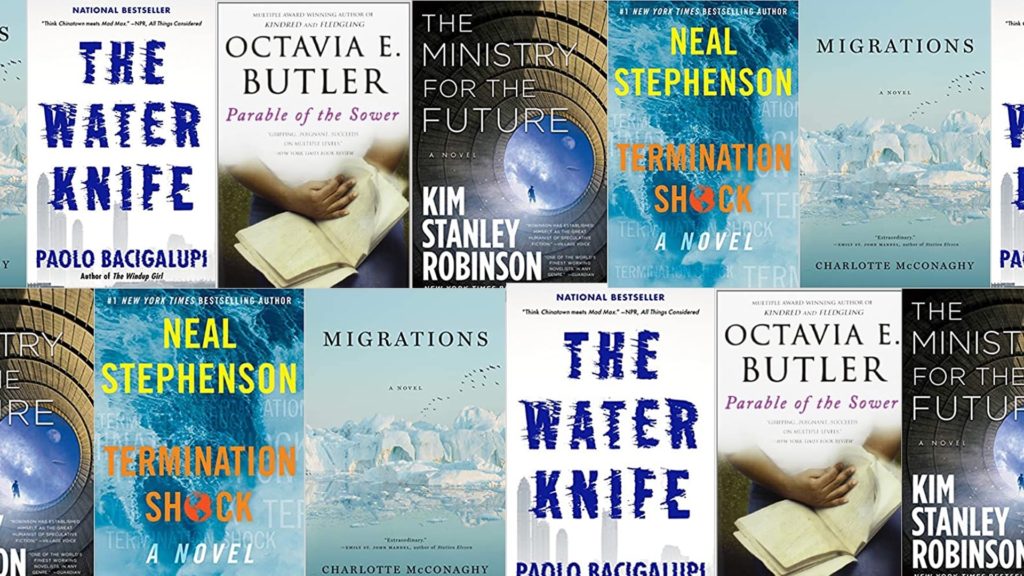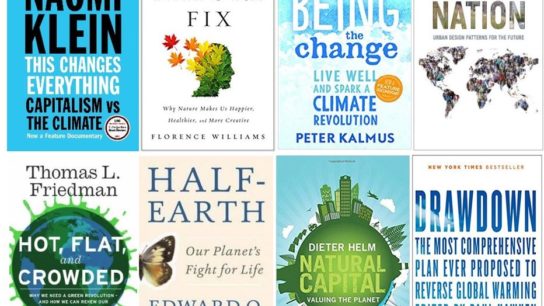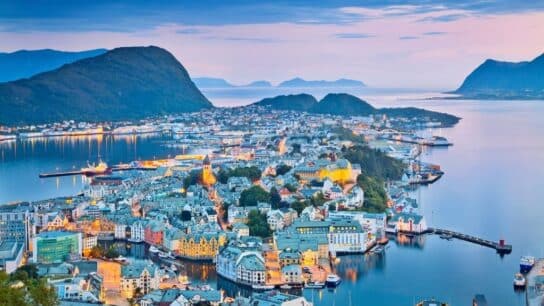Climate change fiction officially went mainstream in 2021. Climate change and its effects are defining the world we live in, and our time’s most astute observers and storytellers have their pens at the ready to describe this new reality. Fictional stories chronicling the circumstances of a changing Earth can range from the terrifyingly dystopian to the inspiringly optimistic. But what all forms and tales of climate fiction share is a call to action, either to avoid a dark future, or to strive for a better one. Here is Earth.Org’s selection of five unmissable climate fiction novels.
—
Literature and fiction are time machines into the past, able to vividly capture the nuances and emotions from a far-removed point in time. Cold War-era global anxieties fuelled the brilliant dystopian fiction of the late 20th century; rapid technological and mechanical revolutions in the 19th century inspired the science fiction classics of H.G. Wells and Jules Verne. We now have a deep and intimate knowledge of bygone eras because of the literature they incited, and for the generations to come, climate change fiction being written today will be their window into our present.
As we grapple with the confusing and disruptive changes of a warming world, all our anxieties, dreams and fears are being transcribed into gripping fictional tales of hope, despair and resilience. In the decades and centuries to come, it may well be that readers and lovers of books will be analysing the early 21st century’s works of literature to understand how humanity coped in such a pivotal time for our species.
There are stories being written now that channel everything we fear the future could be, and everything we still hope for, and as climate change becomes an intractable public issue across the world, authors from every genre are turning their creative gaze towards climate change fiction. If one is looking for hope, inspiration, solutions or simply a new perspective on what a changing climate will mean for us and our planet, consider picking up one of these fascinating and thought-provoking books.
1. The Ministry for the Future, by Kim Stanley Robinson (2020)
Kim Stanley Robinson is certainly one of modern science fiction’s forefathers, but his work has long addressed ecological and biological themes. The author’s interest in environmental issues has been evident throughout his nearly 40-year career, including the acclaimed Mars trilogy. But climate truly took centre stage in his 2020 outing: The Ministry for the Future.
Robinson’s latest book delves into the very topical need for a global agency whose mandate is to protect the rights of future generations of unborn people and animals. Our actions violate the planet’s livelihood today, but this damage is minimal relative to the suffering that unmitigated climate change and biodiversity loss will inflict on our descendants. Robinson details, chapter by chapter, how such a ministry would operate and what it would have to do to accomplish its goals.
The tale of how the ministry operates centres around the experiences of two people from very different backgrounds struggling with very different challenges and traumas, but what truly sets The Ministry for the Future apart is its vivid, and often visceral, episodic descriptions of how humans have adapted to life in a warmer world.
These are isolated story arcs, framed as fictional eyewitness accounts peppered throughout the book, and each is deeply human, representing the most hopeful and the desperate tendencies of humanity. One of these episodes, contained in the book’s very first chapter, may well be the most harrowing literary depiction of climate change ever put to paper, and sets the tone for a novel that does not hold back from the uncomfortable realities of what sacrifices our brighter future will incur.
2. Migrations, by Charlotte McConaghy (2020)
In this deeply personal and emotional book, McConaghy places us in a world that on the surface appears much the same as ours, but becomes progressively more unrecognisable as its details become clearer. In this dire future, a rampant global extinction event brought on by climate change and unrestrained human activity has left the Earth virtually devoid of animal life. Humans are still here, but we will soon be alone.
At its core, Migrations is a simple story about a woman battling internal demons and grief who embarks on a dangerous nautical voyage following the last known family of Arctic terns. These birds are known for covering exceptionally long distances, and are about to undertake what will probably be their last, epic journey from the Greenland interior to the icy shores of Antarctica. But it is McConaghy’s incredibly crafted characters and excellently paced narrative that make this book a deep meditation on what it means to be human in a world we’ve ruined.
Migrations is a gripping, powerful merging of climate change fiction and naturalist writing. While it can at times be a crushing read, it is also a hopeful introspection of what our responsibilities are towards the ecological world and to those species that also call the Earth their home. How much do we owe them, and would it still be home without them?
You might also like: 20 Best Books on Climate Change and Sustainability
3. Termination Shock, by Neal Stephenson (2021)
Neal Stephenson is an author who has built his career on predicting the future. He is, after all, the man who first coined the term for 2021’s biggest tech buzzword: the metaverse, having come up with the idea almost 30 years ago in his 1992 science fiction novel Snow Crash. Since then, he has gone on to become one of the world’s foremost science fiction novelists, with an emphasis on scientifically accurate, or at least conceivable, hard science fiction. In 2021, the acclaimed writer and futurist finally turned his attention towards the climate crisis with Termination Shock.
Like all Stephenson novels, Termination Shock directly and resolutely deals with the most advanced and prescient technology of the time. In this case, it is solar geoengineering, a hypothesised ‘last-resort’ technological fix to climate change that would involve artificially adjusting global temperatures by injecting aerosols into the atmosphere that would reflect some of the Sun’s rays. Geoengineering is an untested solution with a lot of possible unintended consequences, some of them potentially catastrophic, but what would happen if an eccentric Texas billionaire got a hold of such a technology and decided to use it anyway?
In a sweeping and exciting mesh of techno-thriller and climate fiction, Stephenson follows through with this plot line as only he can, and the result is an inventive and yet fully believable portrait of humanity’s ambition and hubris. Stephenson’s work is never short on thought-provoking big ideas, and Termination Shock is no exception.
4. The Water Knife, by Paolo Bacigalupi (2016)
The Colorado River basin supports a regional economy worth USD$1.4 trillion that, if it were its own country, would be the seventh largest in the world. So should the river suddenly dry up, the consequences would be extremely dire.
This is the central plot thread of Paolo Bacigalupi’s 2015 novel, The Water Knife, which details an intense militaristic outbreak in the US fuelled by the Colorado River’s dwindling state. This is an exciting climate thriller that has a little bit of everything, from exposing corporate greed to unequal land rights. But at the core of Bacigalupi’s story lies a very real cautionary tale of the consequences behind one of the most serious effects of climate change: water shortages.
Like many other freshwater sources across the world that have sustained civilisation for the entirety of human history, the Colorado River is dying, as warmer temperatures have devastated the mountaintop snowpacks that fed it for millenia. What will follow is anybody’s guess, but Bacigalupi shows us how terrifying the prospect of a proper water war might be, and why we need to dedicate our best efforts to avoid this very plausible scenario.
5. Parable of the Sower, by Octavia E. Butler (1993)
When Parable of the Sower was published back in 1993, few people had any knowledge of climate change and what it would mean for us and our planet. And yet the late, great Octavia Butler was able to write a presciently aware book that still outshines much of the dystopian climate fiction novels we see today.
Set in the mid-2020s, Butler accurately depicts a ravaged world where climate change has aggravated water and food shortages, wealth inequality and social injustice. Within this world of terror and hostility, a young girl realises she was born with a rare gift: empathy, and the ability to share other people’s pain. What follows is a beautifully written journey through the American heartland, where our protagonists are constantly surrounded and threatened by the realities of a terrifying warmer world. And yet hope and the birth of a new vision for the future still emerges from simple acts of empathy that can heal even the most vitriolic wounds.
Parable of the Sower stands out for several reasons in addition to being one of the first climate change fiction books in our literary canon. It depicts a world that may have been speculative 30 years ago and is now agonisingly close to becoming a reality, but it also depicts a world where human nature is inherently good and can overcome even the most ardent challenges.














